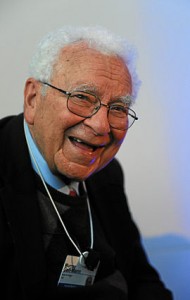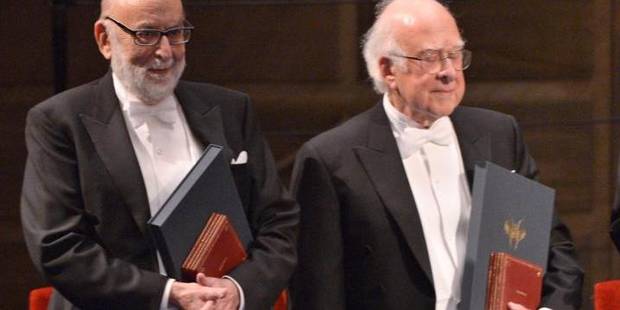Today was the Nobel Prize ceremony, including of course the Physics Prize to François Englert and Peter Higgs. Congratulations once again to them!
(Parenthetically, it’s sad that the Nobel is used to puff up national pride. In Belgium, Englert gets into the headline but not Higgs; in the UK, it’s the other way around.)
I of course had nothing to do with the physics behind this year’s Nobel, but I did write a book about it, so I’ve had a chance to do a little commentating here and there. I wrote a short piece for The Independent that tries to place the contribution in historical context. I’ve had a bit of practice by now in talking about this topic to general audiences, so consider this the distillation of the best I can do! (It’s a UK newspaper, so naturally only Higgs is mentioned in the headline.) I love how, at the bottom of the story, you can register your level of agreement, from “strongly agree” to “strongly disagree.” And if you prefer your words spoken aloud, here I am on the BBC talking about the book.
 Meanwhile here at Caltech, we welcomed back favorite son Murray Gell-Mann (who spends his days at the Santa Fe Institute these days) for the 50th anniversary of quarks. One of the speakers, Geoffrey West, pointed out that no Nobel was awarded for the idea of quarks. Gell-Mann did of course win the Nobel in 1969, but that was “for his contributions and discoveries concerning the classification of elementary particles and their interactions”. In other words, strangeness, SU(3) flavor symmetry, the Eightfold Way, and the prediction of the Omega-minus particle. (Other things Gell-Mann helped invent: kaon mixing, the renormalization group, the sigma model for pions, color and quantum chromodynamics, the seesaw mechanism for neutrino masses, and the decoherent histories approach to quantum mechanics. He is kind of a big deal.)
Meanwhile here at Caltech, we welcomed back favorite son Murray Gell-Mann (who spends his days at the Santa Fe Institute these days) for the 50th anniversary of quarks. One of the speakers, Geoffrey West, pointed out that no Nobel was awarded for the idea of quarks. Gell-Mann did of course win the Nobel in 1969, but that was “for his contributions and discoveries concerning the classification of elementary particles and their interactions”. In other words, strangeness, SU(3) flavor symmetry, the Eightfold Way, and the prediction of the Omega-minus particle. (Other things Gell-Mann helped invent: kaon mixing, the renormalization group, the sigma model for pions, color and quantum chromodynamics, the seesaw mechanism for neutrino masses, and the decoherent histories approach to quantum mechanics. He is kind of a big deal.)
But, while we now understand SU(3) flavor symmetry in terms of the quark model (the up/down/strange quarks are all light compared to the QCD scale, giving rise to an approximate symmetry), the idea of quarks itself wasn’t honored by the 1969 prize. If it had been, the prize certainly would have been shared by George Zweig, who proposed the idea independently. So there’s still time to give out the Nobel for the quark model! Perhaps Gell-Mann and Zweig could share it with Harald Fritzsch, who collaborated with Gell-Mann on the invention of color and QCD. (The fact that QCD is asymptotically free won a prize for Gross, Politzer and Wilczek in 2004, but there hasn’t been a prize for the invention of the theory itself.) Modern particle physics has such a rich and fascinating history, we should honor it as accurately as possible.

“He is kind of a big deal.”
Good one. Just the greatest living physicist.
The Infinity Puzzle, by Frank Close, is a very good non-technical look at the history of QFT (disclaimer: I’m a layman). And in it, a case is made for James Bjorken of SLAC as a candidate for the Nobel, for his role in the realisation of quarks as ‘real things’ as opposed to mere theoretical entities. What are your thoughts on this, Dr. Carroll?
And as regards the 2013 Nobel, I (web-)tuned in at just the right time to watch the physics prizes being awarded.
Things nobody in the history of the world has ever said ever: “Higgs boson? Huh? … Oh, you mean the God Particle! Now I know what you’re talking about!“
It shouldn’t come as a surprise that Gell-Mann didn’t receive the Nobel for the invention of quarks: it has always been a policy of the Nobel physics committee not to award the prize for pure theoretical achievements. A theory corroborated by observation/experiment—yes; a theory very beautiful and consistent, but uncorroborated—no! That’s why Higgs had to wait so long and that’s why Einstein didn’t get it at the time for Special Relativity but for the photoelectric effect.
I guess Gell-Mann might still have a chance at a second Nobel, if unequivocal free quarks somehow register in a particles accelerator detector.
Regarding the sad use of the Nobel to “puff up national pride” perhaps the award should come with a statement that it was “given in peace for all mankind.”
Good point about Gell-Mann and the free quarks, DEL. There’s one or two little issues there I suppose.
Pingback: My First Strange Encounter with Murray Gell-Mann - Fire in the Mind | DiscoverMagazine.com
Another major influence of Gell-Mann, from Wikipedia:
“He is also known to have played a large role in keeping string theory alive through the 1970s and early 1980s, supporting that line of research at a time when it was unpopular.”
“Other things Gell-Mann helped invent…”
I may be late to the party, as this is my first time here, but wouldn’t “discover be a better word than “invent?” Like, you “invent” a lightbulb. But you “discover” natural events. Right?
I think ‘invented’ is as good if not a better description than discovered. He (as have other physicists for hundreds of years) invented mathematical models that helped explain certain aspects of nature. No one can say whether in the future these models will be shown to be complete or a completely accurate description.
Another reason for using ”invent” rather than “discover” is that one cannot claim an objective, physical-type, existence of physical theories or pure theoretical entities. The best proof for this is historical: such theories has occasionally been revolutionized, and such entities has occasionally been eliminated.
Just suppose a better model—more Occam yet as consistent and predictive—than the 3-quarks model is invented. That will be a great gloat for science but a great grief for scientists too emotionally and career-wise invested in quarks. And what would it say on the “discovery” of the no-longer-there quarks?
I believe the entire cosmology community would rejoice and be relieved if a “better” (see above) explanation is found that makes the assumption of dark matter redundant. But what would it then mean for the “discovery” of dark matter?
Personally I’m even more radical than that: I also include in the “invented” category also entities that have been entrenched in physics for centuries: Newtonian forces and Faraday-ian fields. That might be shocking to some, but I’ve never witnessed a space launch vehicle lifts off with a force-vector arrow stuck in its behind.
I expect it will be more middle-of-the-road, DEL. For example, check out this topological quantum field theory page. It’s still quantum field theory, and it’s been around for years so it isn’t something totally radical. Even Ed Witten has had a hand in it. Anyway, see the blue trefoil knots at the top? Start at the bottom left and trace round it anticlockwise calling out the crossing-over directions: up down up. Break this thing and you don’t get some mess of quarks and gluons spilling out like beans from a bag.
That should be much of a surprise though, check out gluons on Wikipedia and note this: “There are also conjectures about other exotic hadrons in which real gluons (as opposed to virtual ones found in ordinary hadrons) would be primary constituents”. Gluons are virtual particles, just “chunks” of field, like you divide a field into little imaginary squares. IMHO it would have been better if the name partons had been the one that stuck.
That point of view seems to mix things up a bit to me. I look at it as attributes of reality, phenomena, are discovered but the tools to model them are invented.
So you are on top of it after all, Darrelle. Newtonian force is indeed not a phenomenon at all but an extremely useful invention without which physical theory may not be possible. Not surprisingly, as far as direct measurement goes force is an unmeasurable: all force-measuring instruments actually measure physical phenomena in which force is said to be involved.
So, a couple of people “disliked” my earlier comment, presumably because it’s not exactly on-topic, though it does tie in with the linked BBC interview, which is what prompted it.
It’s something I’ve been wanting to say somewhere for a while now: a succinct, satirical way of expressing why the media’s use of the term “God Particle” is so detestable. I decided to dump it here because why not, because after watching the BBC interview I felt it was near enough to topic, and because I thought it would give readers a modest smile.
Personally I think enabling comment ratings on blogs is a bad idea. All it does is give people an opportunity to be judgemental.
I am not sure what this means. As far as I can recall we have never discussed this, or anything else, before now. Something lost in translation? Gentle sarcasm? Condescension? Something else?
I am not sure exactly what you mean here either. I’d tentatively say we have similar views in this. I agree that Newtonian force is an invention. A very useful tool that enables us to make accurate predictions about certain categories of phenomena. Those phenomena, regardless of whatever labels we attach to them or tools we invent to model them, or to what degree our conceptualizations of them actually map to reality, are characteristics of our reality independent of us and whatever we may invent to try and undertand them.
My view does, of course, depend on a useful defintion of the term reality.
No sarcasm and no condescention. You wrote “That point of view seems to mix things up a bit to me.” What I meant was that the views you had expressed showed no signs of things being mixed up. I thought I was saying something positive. Sorry for the misunderstanding. I hope it’s cleared now.
No worries. I wasn’t offended, just curious. Apologies for misinterpreting you.
With respect to Gell-Mann and theoretical work needed experimental vindication before receiving the Nobel, if the prediction of Omega minus wasn’t good enough surely the detection of three scattering centers in the nucleon is as good as the Higgs detection. That work did result in a Nobel for Jerome Friedman, Henry Kendall, and Richard Taylor, the experimentalists, in 1990, but Gell-Mann was neglected.